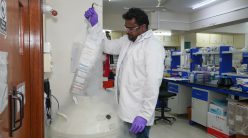
Helaine Selin, a retired science librarian from Hampshire College, Massachusetts, USA, is an author and an editor of several books, such as Encyclopaedia of the History of Science, Technology, and Medicine in Non-Western Cultures, Astronomy Across Cultures: The History of Non-Western Astronomy, and Childbirth Across Cultures: Ideas and Practices of Pregnancy, Childbirth and the Postpartum. Selin has also co-edited The Encyclopaedia of Classical Indian Sciences with Roddam Narasimha, former professor of aerospace engineering, IISc, and Chair of Engineering Mechanics Unit, Jawaharlal Nehru Centre for Advanced Scientific Research, Bangalore.
During her visit to IISc in March 2017, Selin spoke about her recent book Happiness Across Cultures: Views of Happiness and Quality of Life in Non-Western Cultures. It is a collection of studies conducted on happiness in non-Western cultures, with two chapters dedicated to India. CONNECT got in touch with her to find out about her journey as an editor and also to understand the multitude of factors that impact happiness.
You have been editing books for more than 20 years now. How did this journey begin?
I was the Science Librarian at a small university in Massachusetts, USA, and we had a grant for a three-year course called ‘Comparative Scientific Traditions’. The grant included some funding to buy library books on the subject, and I actually looked at all 1200 books [available] and made an annotated bibliography. The publisher of that bibliography asked if I’d be interested in doing an encyclopaedia on the topic of non-Western science, technology and medicine. I said “yes” without thinking what that really meant. What it did mean was six years of work, after work[ing hours] every day and every evening. And I loved doing it.
As an editor, one of the things you must have had to deal with is jargon that academic texts are replete with. How did you do it?
I try very hard to make the work readable, but I’m not always successful. Since I’m not an expert at any of the topics that scholars write about, I figure that if I can’t understand it, it’s not written well enough. I have come to understand that people like to have their work made understandable, even if they are not capable of doing it themselves. I once changed so much of someone’s work that I thought he’d be angry. In the end, he was very grateful. He asked what I did, and I said I’d put it through the “dejargonator”.
I have come to understand that people like to have their work made understandable, even if they are not capable of doing it themselves
It seems to me that we all have different definitions of happiness. Is this because happiness means different things to different people or because it is vague and elusive or is it all a matter of semantics?
Well, I think you supplied your own response here. It’s clear that what makes one person happy might not be the case for another person. The difference is that these studies try to deal with a culture or a country and not individuals, although of course, the researchers get their data from individuals.
Do you think studies on happiness are relevant? If so, why?
I think that happiness is elusive and unquantifiable, but we are in the age where we have to quantify everything. The advantage of the studies is that perhaps people in government will be able to make changes for their people and improve their lives. I mistrust some of the studies, but I think you have to have a certain amount of distrust for all studies. At the same time, it’s clear that some countries, societies, and people are happier than others, and it would be nice to make things more equal if that is possible.
I think that happiness is elusive and unquantifiable, but we are in the age where we have to quantify everything.
You have scoured through many studies on happiness. What are the most important ingredients of happiness? Are prosperous societies happier?
For the most part, economic security helps people be happier. But so does equality, the ability to make decisions for yourself, a good government, good health and social security, and lots of social interaction with friends and family.
Do you think culture influences happiness?
Yes. Some cultures seem to take life as it comes and not worry too much about the past or the future. Others seem to suffer from too much emphasis on accomplishment, achievement and continual improvement.
Some cultures seem to take life as it comes and not worry too much about the past or the future. Others seem to suffer from too much emphasis on accomplishment, achievement and continual improvement
What does happiness mean to you?
I had a very rough beginning for the first 20 years of my life, and a pretty seriously happy one since then (I’m 71). For me, happiness has a lot to do with love, laughter, good work, good friends, and good family. I’ve been very fortunate to find all of those in my life. But it wasn’t easy to get here.
What was your first impression of IISc when you visited? Do you find it a happy place to be?
I love being here at IISc. I always feel welcomed and admired and I tend to admire and hold in high regard the people I meet here.
Are you working on any book now?
I’m not really working on any books now. The only work I’m doing, besides being a grandmother, has to do with the positive effects of serious illness. I find this very fascinating and there is some very interesting literature. I think I’ll start with an article, but it might turn into a book someday.




